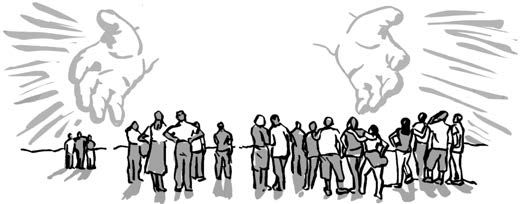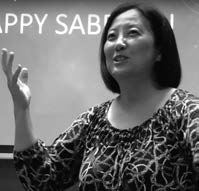Food ran out on Sunday morning in nine-year-old Joanne’s home. Father abandoned the family after Mother started attending the Seventh-day Adventist Church in the U.S. state of Oregon. Father, who had immigrated with the family to the United States from South Korea, made it clear he would never help them. “If you choose God, let your God feed you,” he said. “Let your God clothe you.” Mother, who didn’t have a job, prayed and cried in her bedroom that Sunday. When lunchtime came, Joanne’s younger sister complained forlornly, “I’m hungry.” Her older brother sat stone-faced, trying to be brave even though he was helpless. Then Joanne remembered reading in Uncle Arthur’s Bedtime Stories
about children who prayed and received help from angels.
“All we have to do is pray!” she exclaimed. “Uncle Arthur’s Bedtime Stories say that if we pray, the angels will bring us food. Let’s pray!”
Brother rolled his eyes. Little Sister complained again about her hunger. Joanne didn’t know how to pray. “Hello, God,” Joanne said. “We are really hungry. Uncle Arthur’s Bedtime Stories say that You can send us food, so would You send us something to eat, please?”
The children waited. No food. Hours passed, and dinnertime came. Joanne thought, What’s wrong? God is late! The children grew hungrier. Mother continued praying and crying in the bedroom.
Then Joanne said, “Oh, I know what we did wrong! God doesn’t think that we believe Him because we didn’t set the table.”
She told her little sister to fetch metal chopsticks from the kitchen. The children set the table and sat down. “Sorry about that, God,” Joanne prayed. “We probably did it wrong. Could You send us some food now? We’re ready!”
But nothing came. The children climbed into bed disappointed and hungry that night. Early in the morning, they woke up to go to school. They had no food for breakfast and no money to buy lunch. “Don’t bother Mother,” Joanne whispered. The children opened the front door to leave the house, but their path was blocked—by a huge box filled with food. Excitedly, the children called their mother to the door. She couldn’t believe her eyes. Joanne was overjoyed. “The
angels were just a little late!” she said.
At that moment, Joanne knew that God lives and that He hears and answers prayers. Joanne Kim (née Park) is now the mother of four children. She and her husband, Jon, a dentist, are missionaries in Mongolia.

